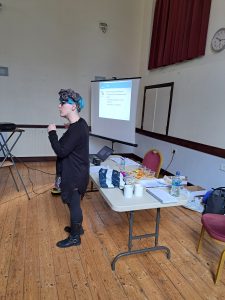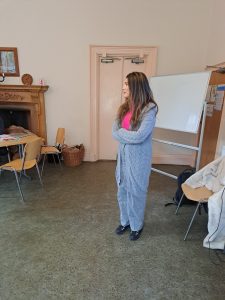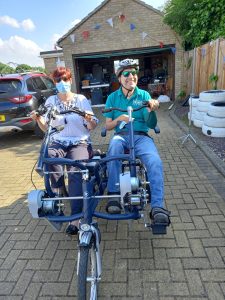Delivering Dosh Money Awareness Training
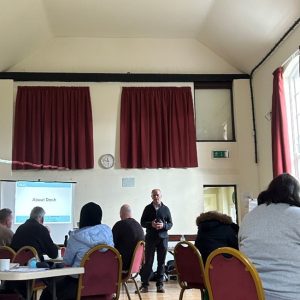
Blog written by Steve Raw, Managing Director of Dosh
Sitting in the car park of the venue for today’s Money Awareness Training waiting for the caretaker to arrive, I am thinking about who I will meet and how the workshop will pan out during the course of the day. It is the feeling of excitement I always experience and is similar to the one I had a couple of weeks ago when I arrived for the training I would be delivering with a colleague in the Scottish Borders.
Whilst this is not my main employment (I am/have been the Managing Director of Dosh* since 2009), it is something I love doing and I think I can speak on behalf of my co-presenters, when I say that they love it too.
Introduction to the workshop and why
Several years ago, a support provider for people with a learning disability experienced some difficulties around their support with money. They had received a warning notice from a regulator that they needed to remedy this situation urgently. My organisation (Dosh Ltd – Financial Advocacy at www.dosh.org) became part of the solution by delivering workshops across the country for their managers and leaders. This is something we quickly found we enjoyed and, from the feedback we received from delegates, were good at it too. Since then, we have been providing our training across England and Scotland. (Not yet in Wales or Northern Ireland, but never say never!)
What the workshop includes:
- Concepts and Values – the support options around money for people we support
- Mental Capacity Act (MCA) 2005 and Best Interest Decisions
- Financial Safeguarding
- State Benefits Awareness
- Introduction to Banking and Banking options for people with a learning disability
- Budgeting, Money Planning, and the Dosh ‘Money Plan Game’
- And a Q & A about supporting people to be more independent and have more control over their money.
Each delegate receives a Money Awareness Workbook which includes information and resources.
Related. Dosh – Play the game featured in our workshop is an interactive a game which was specifically designed for people with a learning disability. Delegates also have an opportunity to play the paper version during our day together.
Delivering training to a team in Sutton in Cambridgeshire
Five things we can do:
- We can customise our workshop to fit the needs of your colleagues. Recently in Scotland an organisation wished to have a focus on Banking; in another part of the country, we were asked to include a presentation on ‘Safeguarding’.
- We make our training accessible for the people attending our workshops. Dosh delivers training to people with a learning disability, support teams, their managers, social workers, and finance teams
- We can deliver workshops anywhere in England, Scotland, and Wales
- Share our workshop presentation in a pdf after our training so that candidates do not need to worry about note taking during the session.
- We provide a follow-up service after the workshop.
What the day involves:
Chocolate! Yes, you read it correctly. We have an activity that you can actually eat and when your energy is beginning to sap, we come to the rescue with a liberal sharing of sweets.
We spend time getting to know our delegates, especially during the activities and the breaks. We find out what worries and challenges them and about supporting people with their money.
Working alongside our delegates as the workshop progresses.
We use a range of media and training methods including videos, film, power point, flip chart, paper exercises and Q & A sessions.
Five things that make us different?
- Financial Advocates who deliver the training also support people daily with their money and state benefits to bank, budget, and plan.
- I am a parent/carer for a woman with a learning disability who copes with autism, so I bring a family member’s perspective to the table.
- We share stories and experiences from our ‘day to day work’ to illustrate our presentations.
- We do not stick rigidly to our programme – if the class wants us to focus on a particular area during the day, we can adjust our programme.
- Our support and training do not end when the workshop finishes as we share our contact details with delegates so they can continue to request information and answer questions they may have thought of after the training.
Feedback from our recent workshops
“Very Informative” “Enjoyable, learning” “Nice and friendly speakers” “Friendly, nice speakers, learning enjoyable” “Enjoyable, easy to understand and interact” “It was spot on” “Very good well presented” “Enjoyable” “Enjoyed the day” “Good action points to take away” “Very good training session very informative” “Very informative and fun” “Valuable information and sweeties”
The best thing about today was: “Gaining more confidence around supporting people with their money” “I will, apply this to my work in the future”
If you would like to hear more about our training and would like to book a workshop, here are some of, out contact details
Information about our training: https://www.dosh.org/training-and-workshops-for-your-group-or-organisation/
email: Angela and Kerry [email protected]
email me: [email protected]
Note: * Dosh is a not-for-profit company, supporting adults with a learning disability to have more control and independence with their money, since 2007.
Kerry Measures March 31st, 2023
Posted In: Banking, News and Blogs, Stories
Mark’s Story
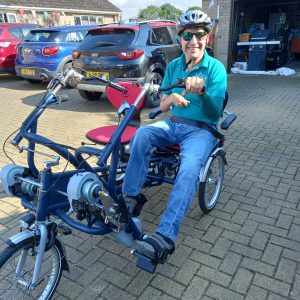
Earlier in the year, Mark expressed that wanted to replace his trike and discussed the idea with his Dosh Financial Advocate who suggested he visit a supplier for a suitable Trike to get some prices.
Whilst shopping around it became clear that he would not be able to fund this solely on his own, but over the year Mark managed to save just over half the amount by following the budget he had agreed with Dosh to give him some savings so he would have more choices.
Mark and Dosh also looked around for additional funding and following further discussions we put together a grant application to his care and support provider for financial assistance.
Before putting in the application, Mark and Dosh discussed this with everyone involved so we all knew what we needed to do to achieve his goal.
Mark then came up with the idea that he could use his new trike to do a sponsored bike ride and raise the funds to repay the grant. We added this proposal to the grant application, what an excellent idea!
Success! The grants team loved the idea of paying it forward and agreed to give Mark the funds he needed, so the trike was ordered and payment was arranged.
Now as you can see Mark is off and enjoying life on the road!
Kerry Measures December 6th, 2022
Posted In: News and Blogs, Stories
Banking Guide – Part 2

How can I get support with Banking?
1. Tell the bank what support and changes you need to help you. Build up a relationship with your local bank, so that they know you and what you need.
2. Ask what reasonable adjustments they can make, for example, to help you take money out of your account easily. Ask what they can do for people with a disability.
3. Ask the bank staff to check with their specialist disability team. They can give staff extra support and information.
4. Ask about the different types of accounts they have.
Remember the important laws:
• The Equality Act says people with a disability must get equal access to banking
• The Mental Capacity Act helps people make their own decisions and explains how to check someone’s capacity.
• Banking laws on identity, data protection and clear information.
| With Capacity | Without Capacity |
| Support (Reasonsable Adjustments) | Appointee Account |
| Third Party Mandate | Court of Protection – Single Decision |
| Joint Account | Court of Protection – Deputy |
| Basic Bank Account | Lasting Power of Attorney (If this was set up when you had capacity |
| Ordinary Power or Attorney | |
| Lasting Power or Attorney |
These accounts are slightly different with each bank.
They may have different names and work in different ways. Ask each bank to tell you what they have
How to deal with problems?
1. Ask them to explain their decision and what else they can do to help you.
2. Ask if they have a disability or customer services team that can help them or that you can talk to.
3. Speak to the manager in the bank.
4. Speak to the bank’s head office.
5. Make a formal complaint to the bank.
6. Report the problem to the Financial Ombudsman Service or Financial Conduct Authority.
7. Contact the Equality Advisory and Support Service helpline, Disability Law Service or Citizens Advice Bureau.
8. Think about taking the bank to court.
Kerry Measures October 10th, 2022
Posted In: Banking, News and Blogs, Stories






